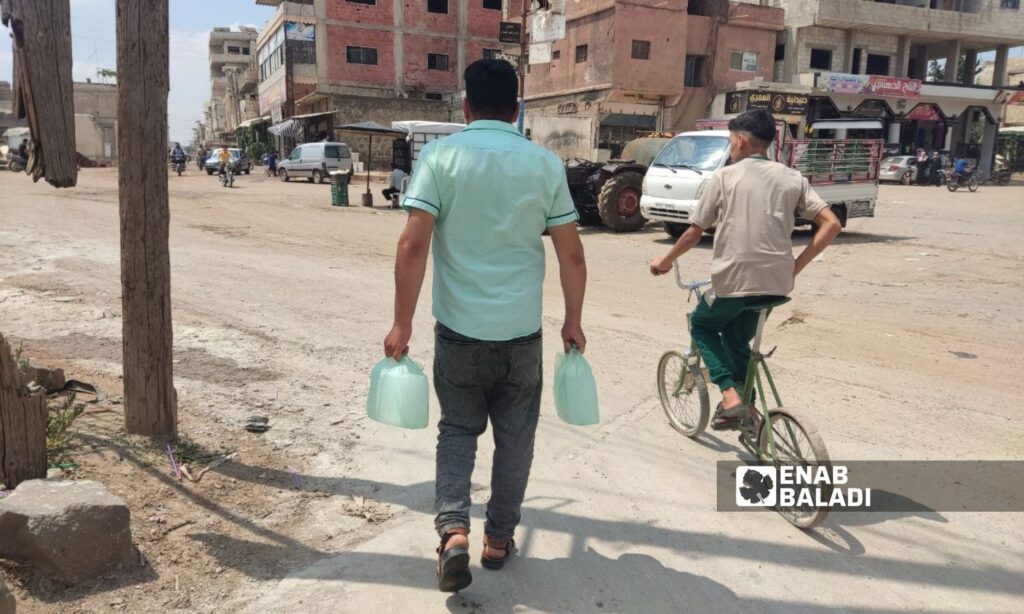Daraa – Halim Muhammad
Abdul Rahman, residing in the town of Tal Shihab in western rural Daraa, has gotten used to buying two ice blocks daily during the current summer season and adding them to drinking water to cool it down.
The 56-year-old man found no alternative to relieve the heat for his six family members, amid almost complete power cuts and lack of means to generate electricity.
According to Abdul Rahman, the family’s consumption increases to three blocks on extremely hot days, pointing out that the price of ice blocks has become an additional daily necessity, against his meager income from agriculture.
The price of an ice block has reached 7,000 Syrian pounds (about half a US dollar) amidst a shortage in availability and concerns about the purity and healthiness of the water from which it is made. Ice-selling shops are crowded, with people waiting for the blocks to arrive from ice factories.
The southern region of Syria has been witnessing a rise in temperatures reaching 40 degrees Celsius this July.
Abdul Rahman mentioned that the water used to make ice blocks is unhealthy, as impurities are visible in the ice, and there are concerns about its source’s cleanliness. However, he does not see this as a reason to deprive himself of a cold drink in such high temperatures.
Traditional alternatives
Bassam, residing in the city of Tafas in western rural Daraa, has adapted to drinking hot water, as he lacks cooling means due to power cuts and cannot afford to buy ice blocks.
Bassam, 50, works along with his family in agriculture. He said they have resorted to traditional methods, such as placing pieces of burlap around water containers and leaving them outside at night to slightly cool the water.
Due to the lack of cooling means resulting from power cuts, residents seek solutions to sleep in less hot environments.
Mohammed sometimes sleeps on his rooftop in the open air, as he cannot sleep indoors due to high temperatures.
Mohammed, 33, used to have a battery-operated fan, but it has worn out and now needs replacement.
The price of a 100-ampere battery of Syrian origin has reached 1 million Syrian pounds (67 US dollars), while the imported equivalent costs up to 1.5 million Syrian pounds (100 US dollars).
Mohammed, who works in daily agricultural labor with a wage of 30,000 Syrian pounds (2 US dollars), currently cannot afford such expenses.
Lengthy power rationing
Daraa governorate experiences power rationing of up to five hours of cut for every one-hour of supply in rural areas and one and a half hours of supply for every four and a half hours of cut in Daraa city center.
During the supply periods, there are frequent blackouts coupled with low current intensity.
Residents do not benefit from the one-hour supply period to cool water, as this requires about three hours of continuous supply.
Hani al-Masalmeh, Director of the Electricity Corporation in Daraa, told the government newspaper, Al-Thawra, that the continuous power cuts are due to the frequency protection system, which disconnects the power in case of load increases.
Al-Masalmeh justified the presence of the frequency protection to protect the transformation stations and centers from load damage.
He mentioned that the increased consumption by agricultural wells, and the installation of electric heaters and air conditioners by citizens, have significantly contributed to the large electricity withdrawal, especially with the limited electricity supply to the governorate, which is only 50 megawatts daily, while the actual need is 400 megawatts.
The Syrian Minister of Electricity, Ghassan al-Zamel, told Al-Watan newspaper in May that the electricity deterioration problem is due to a lack of oil derivatives supplies.
Costly alternatives
Families in Daraa can overcome the issues imposed by electrical rationing by installing a solar energy system sufficient for household needs, including operating the refrigerator, washing machine, and fans.
This option has become costly due to the high prices of solar panels, batteries, and voltage boosters, with the price of a solar panel reaching 100 US dollars and a voltage booster costing between 300 and 500 US dollars.
Abdul Rahman from Tal Shihab said he visited a shop selling these supplies and found that the minimum cost was 15 million Syrian pounds (1000 US dollars).
Running a diesel-powered generator is also an alternative, but it has become infeasible for residents due to the high price of diesel, which has reached 18,000 Syrian pounds per liter. Some engines need two liters per hour.

